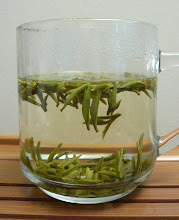Today is the 101st birthday of Hua Luogeng (华罗庚,1010-1985), one of the greatest contemporary Chinese mathematicians. He was an academician of Chinese Academy of Sciences and a foreign academician of United States National Academy of Sciences.
The picture above is today's Google logo on its Hong Kong website (google.hk). The 1+1 indicates Hua's significant contribution to solving Goldbach's Conjecture before its "1+1" stage. Up to now, Goldbach's Conjecture is not completely solved yet and deemed by many mathematicians as the most difficult mathematic problem ever.
In China, Hua Luogeng is best known for his innovative work on Integrated Approach, which was applied in many industries, as well as various other aspects of the society. In the google picture, the teapot and teacup indicate this achievement of Hua's. Hua was known to be a tea lover. His work of Integrated Approach germinated when he boiled water for tea and pondered what would be the most efficient plan to boil the water, rinse the tea ware and brew the tea.
Hua was not only a genius scientist, but also a very interesting person.
In 1930, at the age of 20, he was invited to work as an assistant professor in Tsinghua University, one of the best universities in China. By that time, he only had a middle school (equivalent to 10th grade in the States) diploma but was already one of the most promising young mathematicians in China.
Between 1936 and 1938, he was a visiting scholar in Cambridge University and published his influential work on Gaussian theories. At that time (and even today), a graduate degree in a world class university like Cambridge would guarantee one a tenured position in China. But Hua didn't apply for a degree diploma, because he didn't think it would make any difference for his life.
In 1938, China was already dragged into war, and most provinces of the country were under Japanese military occupation. Some of the best universities and best scholars of China recessed to the Southwest. There, life was hard, people were short of everything, but they continued their academic lives, and drank tea every day! (I expressed my admiration of Kunming Era in this blog.) At that time, for many Chinese overseas, China was the home that they couldn't go back. But in the year of 1938, Hua left Cambridge for Kunming, joined his Tsinghua University colleagues in teaching and mathematics research.
In 1946, Hua was invited by Princeton University as a researcher. He worked there till 1948. In 1948, he was awarded a tenured position as a full professor in University of Illinois Urbana-Champaign. But in 1950, he gave up his tenure and returned to China. In the next decades, throughout all the political storms in China, he wasn't treated fairly all the time. I am sure he and his family would have had a much more peaceful and comfortable life in the States. But by giving up that kind of life, Hua made significant contributions to mathematics research in China. In addition, a whole generation of Chinese mathematicians and computer scientists owed their enlightenment and mentorship to Hua Luogeng.
In 1985, Hua Luogeng died of heart attack in Tokyo, Japan, right after he finished an hour-long research lecture. He experienced a fast death at the podium. I think, this is one of the best and luckiest ways of dying.
So today we raise our cups to celebrate the life of Hua Luogeng.
六堡茶道美学煮茶
3 years ago
































4 comments:
It seems tea does really increase your lifespan!
And intelligence :-D
This was fascinating; I had never even heard of this person before reading this article, and I studied math and learned of a lot of different mathematicians.
I really enjoyed your blog post.
Post a Comment